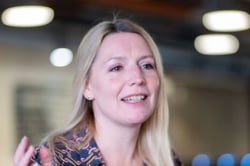The road to Net Zero: How can government overcome the barriers to delivery?
The UK Government has committed to become Net Zero by 2050. But a lack of prioritisation, investment and data are among the key barriers to progress, according to a soon to be released study by Kin + Carta and Government Transformation Magazine.
So how can government departments bridge the gap between commitment and delivery? We put this question to senior civil servants, executives from Kin+Carta and Government Transformation Magazine’s General Manager David Wilde.
Getting the narrative right
Greater clarity and cross-department collaboration is needed on what government is doing to drive Net Zero by 2050. In many places targets are not yet in place and when they are, these are not prioritised.
As ever, priorities boil down to where the funding is. Unfortunately, sustainability, climate change and Net Zero are not within the Prime Minister’s key five priorities for 2023, civil servants noted. “Building the right narrative around Net Zero by first having a clearly defined set of goals provides a business case, which can then drive investment and senior leadership buy-in,” explained one senior civil servant.
Without an agreed upon roadmap to Net Zero, it is too easy for leaders to shirk responsibility. Governments work on three-year funding cycles and five-year terms, but to affect change and meet climate targets, senior leadership need to be able to think beyond that - otherwise it is too easy to kick the can down the road, another civil servant said.
Having a series of interim targets could ensure that sustainability rises up the priority list in government, they noted.
Building engagement
The appetite to change is there; but a lack of knowledge and skills on what direction to take is a major barrier to delivery. “The will is there but no-one knows what they should be doing. There is no cheat sheet or manual on how to make a start, which is the fundamental problem right now,” says Emma Charles, Director of Public Sector Delivery & Operations at Kin + Carta.
direction to take is a major barrier to delivery. “The will is there but no-one knows what they should be doing. There is no cheat sheet or manual on how to make a start, which is the fundamental problem right now,” says Emma Charles, Director of Public Sector Delivery & Operations at Kin + Carta.
Educating and building engagement around climate goals is key to moving forward on this. Harnessing a coalition of the willing and fostering the right talent within an organisation are effective ways to achieve this, civil servants noted.
 “Culture and behavioural change is key and this can only happen from the bottom up, which requires the right people with the right attitude. This is why empowering a coalition of the willing, and giving them the opportunity to build their skills and capabilities can be so impactful,” said Natalie Jones, Director of the GOV.UK One Login Programme at Government Digital Services.
“Culture and behavioural change is key and this can only happen from the bottom up, which requires the right people with the right attitude. This is why empowering a coalition of the willing, and giving them the opportunity to build their skills and capabilities can be so impactful,” said Natalie Jones, Director of the GOV.UK One Login Programme at Government Digital Services.
The education piece is key. An ongoing challenge is getting people to understand what it is they are actually being asked to do; especially without an industry-wide consensus on what is needed and competing information from leadership. It was pointed out that we are often presented with multiple, sometimes contradicting, sustainable choices where it is not always clear what the best or ‘greener’ option really is.
 One solution is to start simplifying the message around Net Zero, said Fiona James, Chief Data Officer and Director of data growth at the Office for National Statistics (ONS). "Uniting around a simplified set of goals and then creating a common language around sustainability that is accessible to all, will help crystalise the message and build intent.”
One solution is to start simplifying the message around Net Zero, said Fiona James, Chief Data Officer and Director of data growth at the Office for National Statistics (ONS). "Uniting around a simplified set of goals and then creating a common language around sustainability that is accessible to all, will help crystalise the message and build intent.”
This can improve communication between colleagues, peers and citizens while enabling digital and sustainability leaders - who don't always speak the same language - to come together on shared goals.
Making data work
It is clear that data has a central role to play in helping reach Net Zero and creating more sustainable practices across government, “but there is a need for further clarity and consistency in how that data is going to be used - particularly when it comes to measuring Scope 3,” said David Wilde, GM at Government Transformation Magazine.
Government Transformation Magazine.
“When it comes to measuring emissions or deciding what KPIs to track, there’s too much deliberation on should we or shouldn’t we. We spend too long trying to work out everything before we work out anything,” said a senior civil servant at the Department for Energy, Security and Net Zero.
Having UK-wide, industry-wide agreements on what needs to be measured and tracking how much progress is being made is imperative, Wilde said. For this to happen, departments need to “stop being so competitive and break away from silos,” he noted. “Encouraging more collaboration and knowledge-sharing across departments to drive collective progress is essential.”
Sustainability benchmarking is recognised as an effective way to incentivise and drive new behaviours. However, this must be implemented in a way that motivates, but does not become a barrier to entry, civil servants said.
 Verifications and definitions around benchmarks are also crucial: “Net Zero or Science Based Targets can mean many different things so definitions must come first. Only then can you set the data to align with benchmarks - otherwise there’s no point having them,” said Junaed Khan, Senior Advisor, Climate Investment Funds at the The Department for Business, Energy and Industrial Strategy (BEIS).
Verifications and definitions around benchmarks are also crucial: “Net Zero or Science Based Targets can mean many different things so definitions must come first. Only then can you set the data to align with benchmarks - otherwise there’s no point having them,” said Junaed Khan, Senior Advisor, Climate Investment Funds at the The Department for Business, Energy and Industrial Strategy (BEIS).
But data alone is not enough. “More accountability is needed,” another civil servant pointed out. “We need to be held to account with regular reviews, otherwise there’s no point in benchmarking.”
Strategic change
Civil servants noted their frustration at feeling they don’t have the mandate or the right resources to enforce the change they want to see. It was suggested by one civil servant to stop waiting for approval: “If you wait for the green light, you’re going to be waiting a very long time,” they said.
Working out how to balance the unintended consequences of well intended action is another challenge. Civil servants spoke about the need to balance sustainable progress with their duty to provide socially responsible change. Sometimes these concepts are at odds. For example, policies restricting housing that fails to comply with low carbon emissions could be an “unintended tightening of the noose” for people who need a roof over their head, one civil servant explained.
The cost-element is key, Charles noted. “A high proportion of people are actually excluded from making the sustainable choice, so making the right thing to do cheaper means people will adopt it in droves - but this requires investment.”
One example held up as a shining example of departments successfully using their own agency to affect change in this way was DWP, which is promoting sustainable practices for customers like low-carbon travel through third party grants. There is a big opportunity there to incentivise people to act differently.
Throughout these conversations, the moral and ethical imperative to lead towards Net Zero by 2050 even if it’s not a ‘now’ priority, is clear.






%20(1).jpg?width=600&name=Chair%20Photo%201.4%20(002)%20(1).jpg)